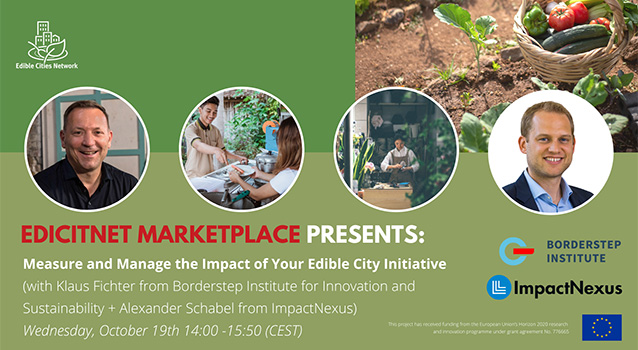Impact management: Borderstep expertise for urban food organizations
What can impact management achieve for urban food organizations and how can impact be measured in practical terms? This was the subject of an international workshop organized by Borderstep and its spin-off ImpactNexus for the EdiCitNet project.
Edible City organizations strive to maximize impact with their products, services, and activities. But how can impact be measured? And how can it be managed and improved in the long term? The online workshop offered international participants the opportunity to implement the first steps in setting up impact management for their organization.
Innovative solutions for the Edible City
The event was opened by Dr. Ina Säumel. She leads the EdiCitNet project at the IRITHESys research institute at Humboldt University in Berlin. Her presentation introduced the international network established by the project for cities that promote and foster innovative Edible City Solutions such as neighborhood gardens, green facade projects or beekeeping programs.
Prof. Dr. Klaus Fichter, Director of the Borderstep Institute, provided insight into impact management concepts, such as the logic model and the cycle of impact management, which form an important basis for the practical implementation of impact measurement.
Impact management tried out in practice
Based on this, Alexander Schabel, Co-Founder of ImpactNexus, introduced practical aspects for impact management. ImpactNexus is a spin-off of the Borderstep Institute that develops software products for companies to measure and improve their sustainability impact. With expert guidance and support from Alexander Schabel, the interactive session gave participants the opportunity to use ImpactNexus’ Impact Goal tool to define their organization’s impact goals, develop an impact model, and define corresponding impact indicators.
In this way, by the end of the workshop, the participants had gone through the first steps necessary to build an impact management system. Now they can use this as a basis for further implementation with their team.
The Edible Cities Network (EdiCitNet) is an EU-funded project to develop and implement innovations in the edible city sector – for green, edible and above all livable cities. The online workshop was offered as part of the EdiCitNet Marketplace, a global platform for networking and strengthening urban food initiatives. The Marketplace is a digital platform for initiatives and organizations that create innovative solutions for urban food production worldwide.


